Organizational Behavior Report: Attitude, Management and Commitment
VerifiedAdded on 2020/04/01
|7
|2153
|95
Report
AI Summary
This report delves into the core concepts of organizational behavior, emphasizing the critical role of employee attitudes and management practices in achieving organizational goals. It explores the impact of attitude on work, highlighting the importance of positive behavior in fostering success and influencing decisions. The report examines job satisfaction and organizational commitment, illustrating how these factors are intertwined and crucial for employee dedication and productivity. It also discusses the manager's role in enhancing employee commitment through motivation, providing a supportive environment, and addressing employee concerns. Furthermore, the report covers the significance of positive attitudes at all levels of the organization for promoting a productive and harmonious work environment. The report also includes several references to support the findings.
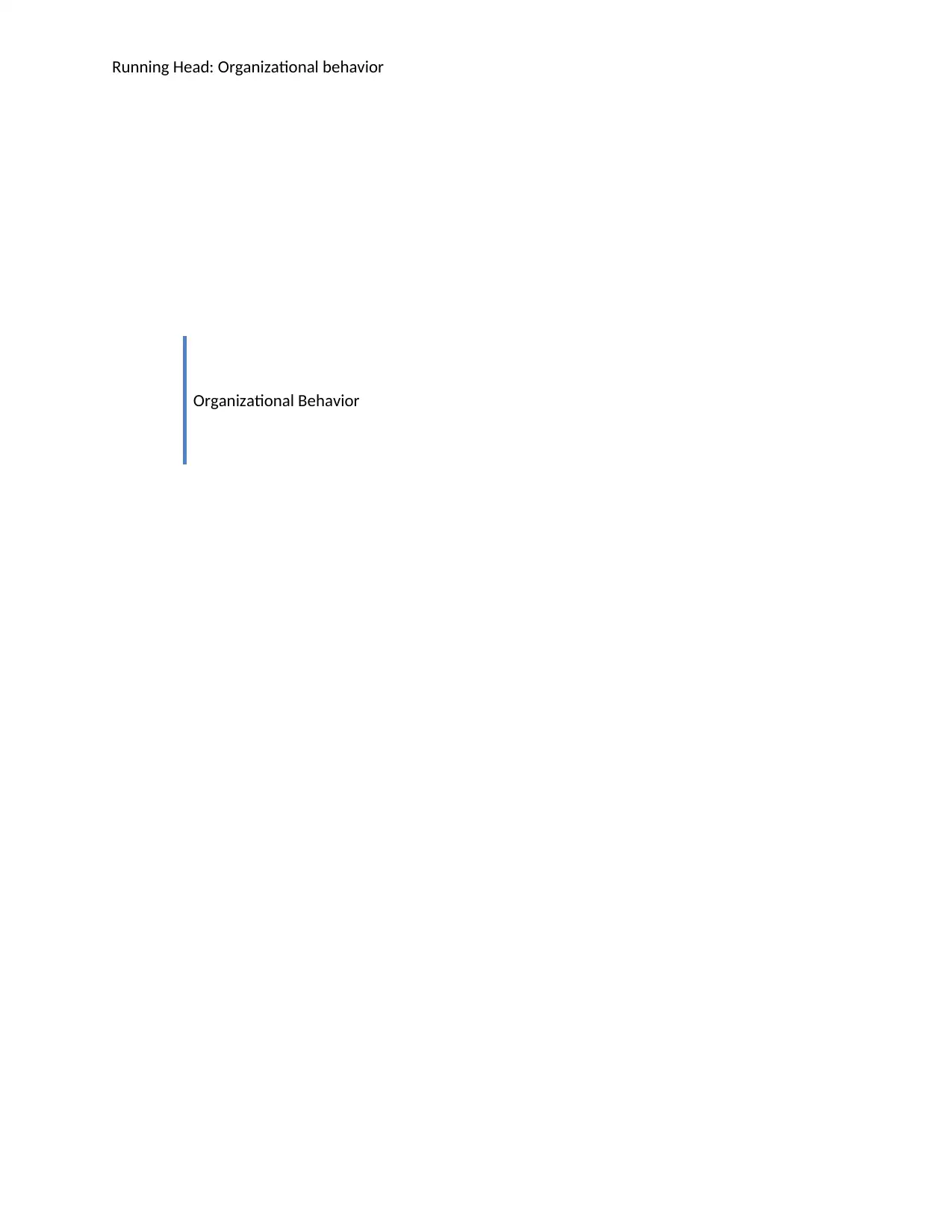
Running Head: Organizational behavior
Organizational Behavior
Organizational Behavior
Paraphrase This Document
Need a fresh take? Get an instant paraphrase of this document with our AI Paraphraser
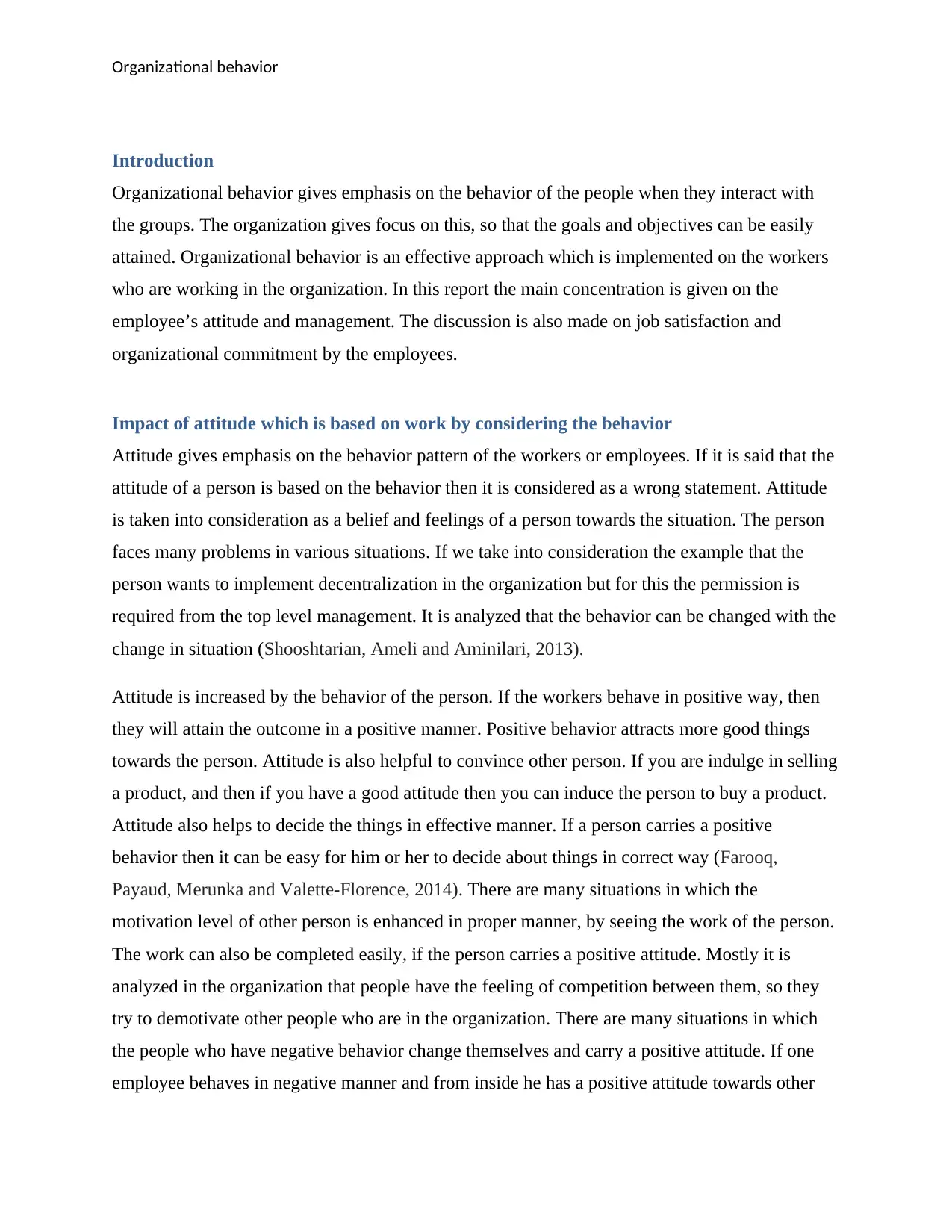
Organizational behavior
Introduction
Organizational behavior gives emphasis on the behavior of the people when they interact with
the groups. The organization gives focus on this, so that the goals and objectives can be easily
attained. Organizational behavior is an effective approach which is implemented on the workers
who are working in the organization. In this report the main concentration is given on the
employee’s attitude and management. The discussion is also made on job satisfaction and
organizational commitment by the employees.
Impact of attitude which is based on work by considering the behavior
Attitude gives emphasis on the behavior pattern of the workers or employees. If it is said that the
attitude of a person is based on the behavior then it is considered as a wrong statement. Attitude
is taken into consideration as a belief and feelings of a person towards the situation. The person
faces many problems in various situations. If we take into consideration the example that the
person wants to implement decentralization in the organization but for this the permission is
required from the top level management. It is analyzed that the behavior can be changed with the
change in situation (Shooshtarian, Ameli and Aminilari, 2013).
Attitude is increased by the behavior of the person. If the workers behave in positive way, then
they will attain the outcome in a positive manner. Positive behavior attracts more good things
towards the person. Attitude is also helpful to convince other person. If you are indulge in selling
a product, and then if you have a good attitude then you can induce the person to buy a product.
Attitude also helps to decide the things in effective manner. If a person carries a positive
behavior then it can be easy for him or her to decide about things in correct way (Farooq,
Payaud, Merunka and Valette-Florence, 2014). There are many situations in which the
motivation level of other person is enhanced in proper manner, by seeing the work of the person.
The work can also be completed easily, if the person carries a positive attitude. Mostly it is
analyzed in the organization that people have the feeling of competition between them, so they
try to demotivate other people who are in the organization. There are many situations in which
the people who have negative behavior change themselves and carry a positive attitude. If one
employee behaves in negative manner and from inside he has a positive attitude towards other
Introduction
Organizational behavior gives emphasis on the behavior of the people when they interact with
the groups. The organization gives focus on this, so that the goals and objectives can be easily
attained. Organizational behavior is an effective approach which is implemented on the workers
who are working in the organization. In this report the main concentration is given on the
employee’s attitude and management. The discussion is also made on job satisfaction and
organizational commitment by the employees.
Impact of attitude which is based on work by considering the behavior
Attitude gives emphasis on the behavior pattern of the workers or employees. If it is said that the
attitude of a person is based on the behavior then it is considered as a wrong statement. Attitude
is taken into consideration as a belief and feelings of a person towards the situation. The person
faces many problems in various situations. If we take into consideration the example that the
person wants to implement decentralization in the organization but for this the permission is
required from the top level management. It is analyzed that the behavior can be changed with the
change in situation (Shooshtarian, Ameli and Aminilari, 2013).
Attitude is increased by the behavior of the person. If the workers behave in positive way, then
they will attain the outcome in a positive manner. Positive behavior attracts more good things
towards the person. Attitude is also helpful to convince other person. If you are indulge in selling
a product, and then if you have a good attitude then you can induce the person to buy a product.
Attitude also helps to decide the things in effective manner. If a person carries a positive
behavior then it can be easy for him or her to decide about things in correct way (Farooq,
Payaud, Merunka and Valette-Florence, 2014). There are many situations in which the
motivation level of other person is enhanced in proper manner, by seeing the work of the person.
The work can also be completed easily, if the person carries a positive attitude. Mostly it is
analyzed in the organization that people have the feeling of competition between them, so they
try to demotivate other people who are in the organization. There are many situations in which
the people who have negative behavior change themselves and carry a positive attitude. If one
employee behaves in negative manner and from inside he has a positive attitude towards other
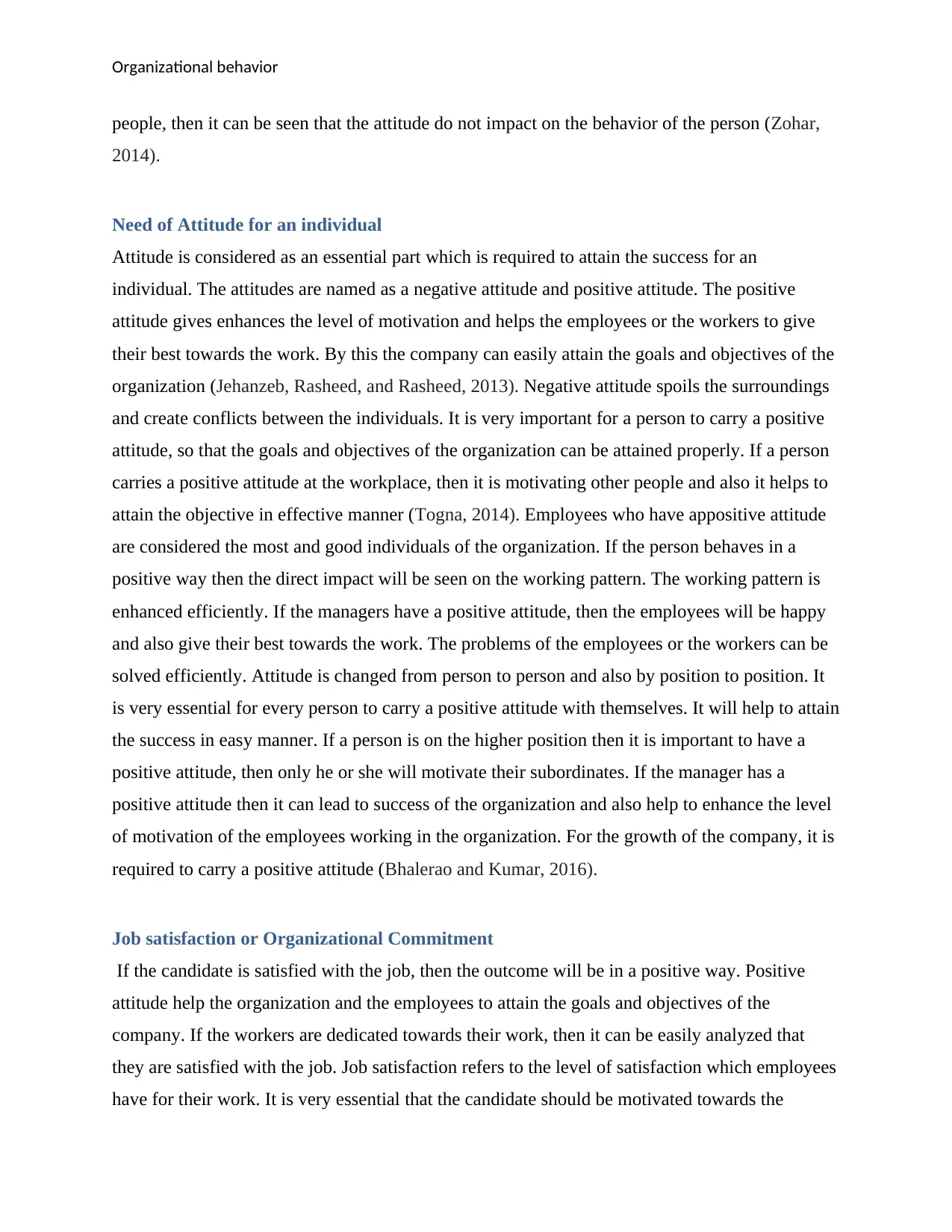
Organizational behavior
people, then it can be seen that the attitude do not impact on the behavior of the person (Zohar,
2014).
Need of Attitude for an individual
Attitude is considered as an essential part which is required to attain the success for an
individual. The attitudes are named as a negative attitude and positive attitude. The positive
attitude gives enhances the level of motivation and helps the employees or the workers to give
their best towards the work. By this the company can easily attain the goals and objectives of the
organization (Jehanzeb, Rasheed, and Rasheed, 2013). Negative attitude spoils the surroundings
and create conflicts between the individuals. It is very important for a person to carry a positive
attitude, so that the goals and objectives of the organization can be attained properly. If a person
carries a positive attitude at the workplace, then it is motivating other people and also it helps to
attain the objective in effective manner (Togna, 2014). Employees who have appositive attitude
are considered the most and good individuals of the organization. If the person behaves in a
positive way then the direct impact will be seen on the working pattern. The working pattern is
enhanced efficiently. If the managers have a positive attitude, then the employees will be happy
and also give their best towards the work. The problems of the employees or the workers can be
solved efficiently. Attitude is changed from person to person and also by position to position. It
is very essential for every person to carry a positive attitude with themselves. It will help to attain
the success in easy manner. If a person is on the higher position then it is important to have a
positive attitude, then only he or she will motivate their subordinates. If the manager has a
positive attitude then it can lead to success of the organization and also help to enhance the level
of motivation of the employees working in the organization. For the growth of the company, it is
required to carry a positive attitude (Bhalerao and Kumar, 2016).
Job satisfaction or Organizational Commitment
If the candidate is satisfied with the job, then the outcome will be in a positive way. Positive
attitude help the organization and the employees to attain the goals and objectives of the
company. If the workers are dedicated towards their work, then it can be easily analyzed that
they are satisfied with the job. Job satisfaction refers to the level of satisfaction which employees
have for their work. It is very essential that the candidate should be motivated towards the
people, then it can be seen that the attitude do not impact on the behavior of the person (Zohar,
2014).
Need of Attitude for an individual
Attitude is considered as an essential part which is required to attain the success for an
individual. The attitudes are named as a negative attitude and positive attitude. The positive
attitude gives enhances the level of motivation and helps the employees or the workers to give
their best towards the work. By this the company can easily attain the goals and objectives of the
organization (Jehanzeb, Rasheed, and Rasheed, 2013). Negative attitude spoils the surroundings
and create conflicts between the individuals. It is very important for a person to carry a positive
attitude, so that the goals and objectives of the organization can be attained properly. If a person
carries a positive attitude at the workplace, then it is motivating other people and also it helps to
attain the objective in effective manner (Togna, 2014). Employees who have appositive attitude
are considered the most and good individuals of the organization. If the person behaves in a
positive way then the direct impact will be seen on the working pattern. The working pattern is
enhanced efficiently. If the managers have a positive attitude, then the employees will be happy
and also give their best towards the work. The problems of the employees or the workers can be
solved efficiently. Attitude is changed from person to person and also by position to position. It
is very essential for every person to carry a positive attitude with themselves. It will help to attain
the success in easy manner. If a person is on the higher position then it is important to have a
positive attitude, then only he or she will motivate their subordinates. If the manager has a
positive attitude then it can lead to success of the organization and also help to enhance the level
of motivation of the employees working in the organization. For the growth of the company, it is
required to carry a positive attitude (Bhalerao and Kumar, 2016).
Job satisfaction or Organizational Commitment
If the candidate is satisfied with the job, then the outcome will be in a positive way. Positive
attitude help the organization and the employees to attain the goals and objectives of the
company. If the workers are dedicated towards their work, then it can be easily analyzed that
they are satisfied with the job. Job satisfaction refers to the level of satisfaction which employees
have for their work. It is very essential that the candidate should be motivated towards the
⊘ This is a preview!⊘
Do you want full access?
Subscribe today to unlock all pages.

Trusted by 1+ million students worldwide
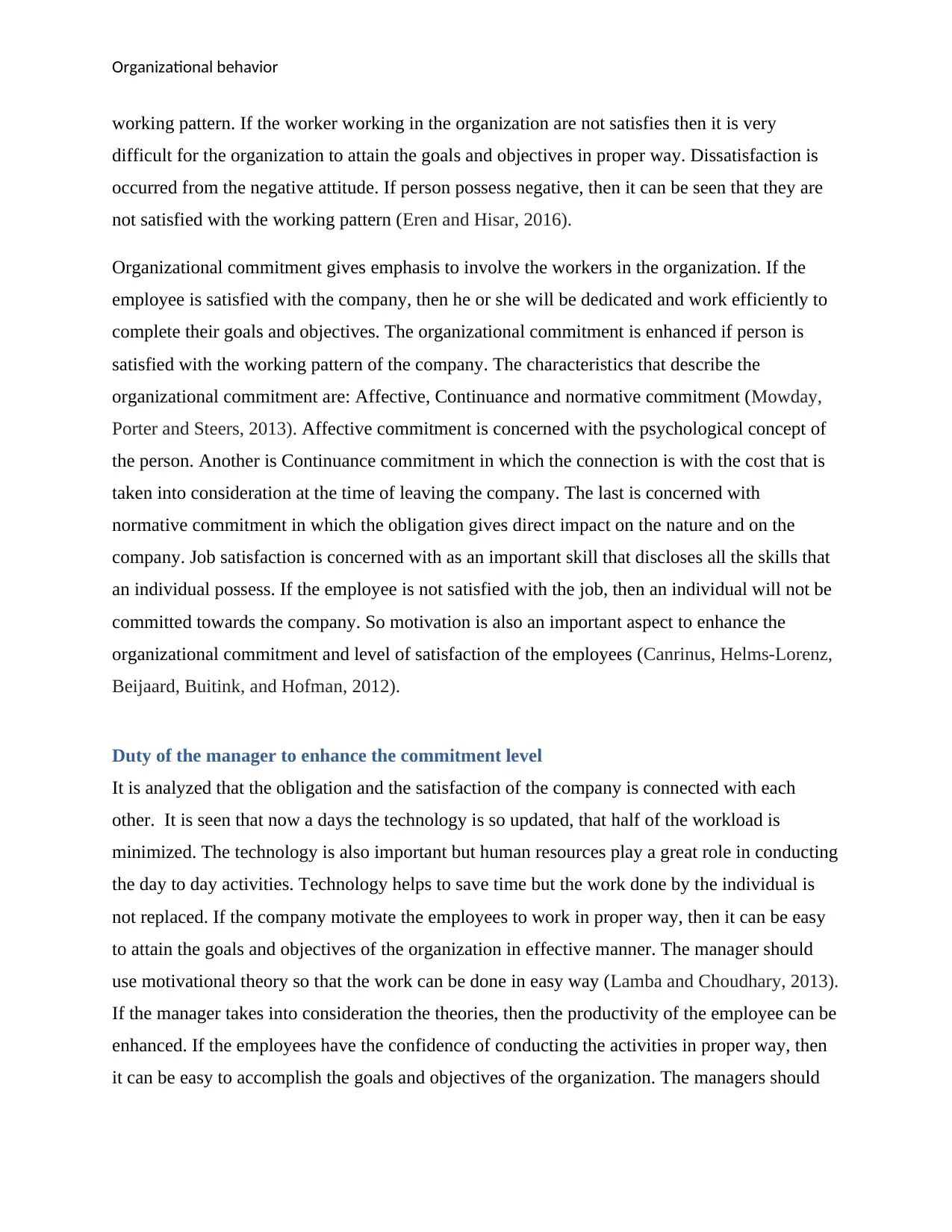
Organizational behavior
working pattern. If the worker working in the organization are not satisfies then it is very
difficult for the organization to attain the goals and objectives in proper way. Dissatisfaction is
occurred from the negative attitude. If person possess negative, then it can be seen that they are
not satisfied with the working pattern (Eren and Hisar, 2016).
Organizational commitment gives emphasis to involve the workers in the organization. If the
employee is satisfied with the company, then he or she will be dedicated and work efficiently to
complete their goals and objectives. The organizational commitment is enhanced if person is
satisfied with the working pattern of the company. The characteristics that describe the
organizational commitment are: Affective, Continuance and normative commitment (Mowday,
Porter and Steers, 2013). Affective commitment is concerned with the psychological concept of
the person. Another is Continuance commitment in which the connection is with the cost that is
taken into consideration at the time of leaving the company. The last is concerned with
normative commitment in which the obligation gives direct impact on the nature and on the
company. Job satisfaction is concerned with as an important skill that discloses all the skills that
an individual possess. If the employee is not satisfied with the job, then an individual will not be
committed towards the company. So motivation is also an important aspect to enhance the
organizational commitment and level of satisfaction of the employees (Canrinus, Helms-Lorenz,
Beijaard, Buitink, and Hofman, 2012).
Duty of the manager to enhance the commitment level
It is analyzed that the obligation and the satisfaction of the company is connected with each
other. It is seen that now a days the technology is so updated, that half of the workload is
minimized. The technology is also important but human resources play a great role in conducting
the day to day activities. Technology helps to save time but the work done by the individual is
not replaced. If the company motivate the employees to work in proper way, then it can be easy
to attain the goals and objectives of the organization in effective manner. The manager should
use motivational theory so that the work can be done in easy way (Lamba and Choudhary, 2013).
If the manager takes into consideration the theories, then the productivity of the employee can be
enhanced. If the employees have the confidence of conducting the activities in proper way, then
it can be easy to accomplish the goals and objectives of the organization. The managers should
working pattern. If the worker working in the organization are not satisfies then it is very
difficult for the organization to attain the goals and objectives in proper way. Dissatisfaction is
occurred from the negative attitude. If person possess negative, then it can be seen that they are
not satisfied with the working pattern (Eren and Hisar, 2016).
Organizational commitment gives emphasis to involve the workers in the organization. If the
employee is satisfied with the company, then he or she will be dedicated and work efficiently to
complete their goals and objectives. The organizational commitment is enhanced if person is
satisfied with the working pattern of the company. The characteristics that describe the
organizational commitment are: Affective, Continuance and normative commitment (Mowday,
Porter and Steers, 2013). Affective commitment is concerned with the psychological concept of
the person. Another is Continuance commitment in which the connection is with the cost that is
taken into consideration at the time of leaving the company. The last is concerned with
normative commitment in which the obligation gives direct impact on the nature and on the
company. Job satisfaction is concerned with as an important skill that discloses all the skills that
an individual possess. If the employee is not satisfied with the job, then an individual will not be
committed towards the company. So motivation is also an important aspect to enhance the
organizational commitment and level of satisfaction of the employees (Canrinus, Helms-Lorenz,
Beijaard, Buitink, and Hofman, 2012).
Duty of the manager to enhance the commitment level
It is analyzed that the obligation and the satisfaction of the company is connected with each
other. It is seen that now a days the technology is so updated, that half of the workload is
minimized. The technology is also important but human resources play a great role in conducting
the day to day activities. Technology helps to save time but the work done by the individual is
not replaced. If the company motivate the employees to work in proper way, then it can be easy
to attain the goals and objectives of the organization in effective manner. The manager should
use motivational theory so that the work can be done in easy way (Lamba and Choudhary, 2013).
If the manager takes into consideration the theories, then the productivity of the employee can be
enhanced. If the employees have the confidence of conducting the activities in proper way, then
it can be easy to accomplish the goals and objectives of the organization. The managers should
Paraphrase This Document
Need a fresh take? Get an instant paraphrase of this document with our AI Paraphraser
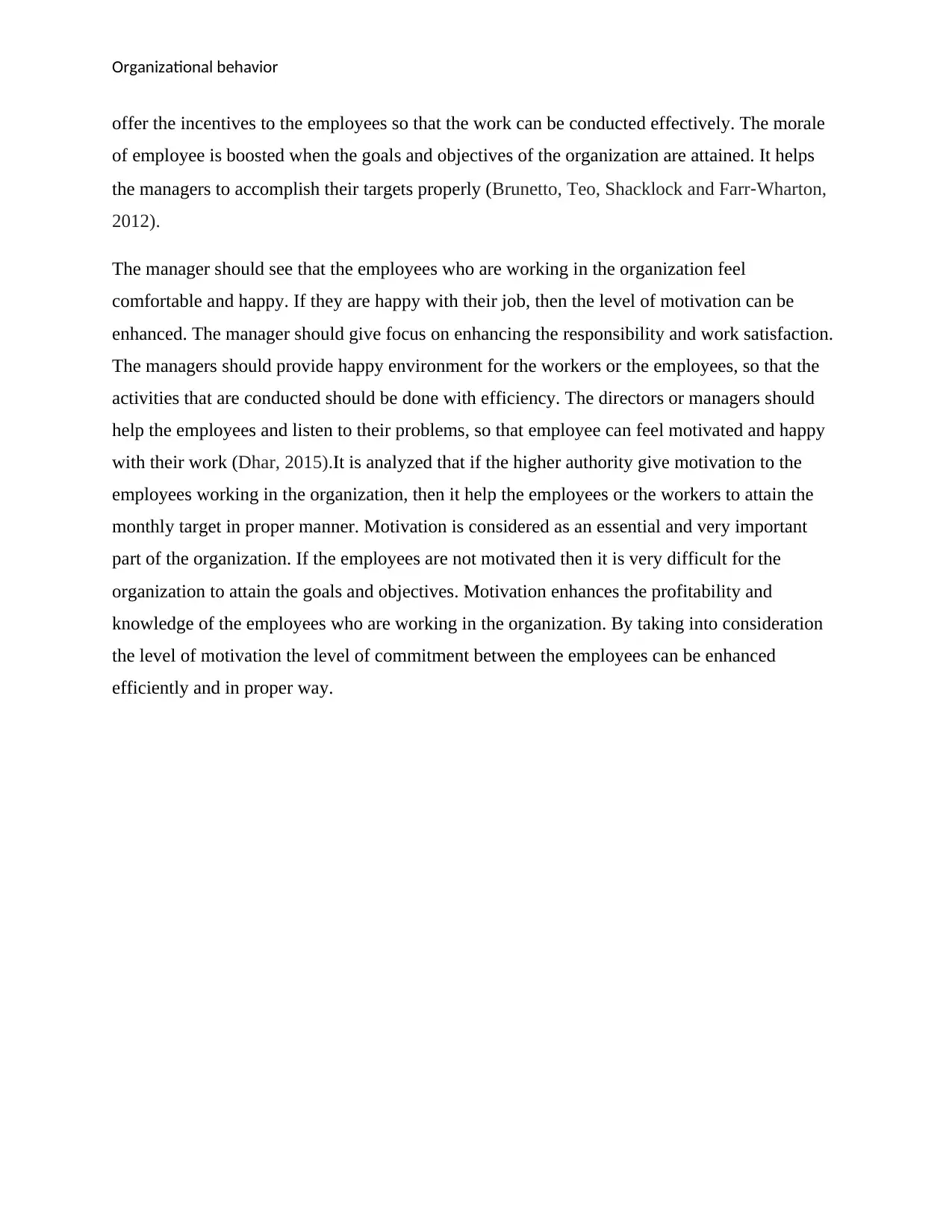
Organizational behavior
offer the incentives to the employees so that the work can be conducted effectively. The morale
of employee is boosted when the goals and objectives of the organization are attained. It helps
the managers to accomplish their targets properly (Brunetto, Teo, Shacklock and Farr‐Wharton,
2012).
The manager should see that the employees who are working in the organization feel
comfortable and happy. If they are happy with their job, then the level of motivation can be
enhanced. The manager should give focus on enhancing the responsibility and work satisfaction.
The managers should provide happy environment for the workers or the employees, so that the
activities that are conducted should be done with efficiency. The directors or managers should
help the employees and listen to their problems, so that employee can feel motivated and happy
with their work (Dhar, 2015).It is analyzed that if the higher authority give motivation to the
employees working in the organization, then it help the employees or the workers to attain the
monthly target in proper manner. Motivation is considered as an essential and very important
part of the organization. If the employees are not motivated then it is very difficult for the
organization to attain the goals and objectives. Motivation enhances the profitability and
knowledge of the employees who are working in the organization. By taking into consideration
the level of motivation the level of commitment between the employees can be enhanced
efficiently and in proper way.
offer the incentives to the employees so that the work can be conducted effectively. The morale
of employee is boosted when the goals and objectives of the organization are attained. It helps
the managers to accomplish their targets properly (Brunetto, Teo, Shacklock and Farr‐Wharton,
2012).
The manager should see that the employees who are working in the organization feel
comfortable and happy. If they are happy with their job, then the level of motivation can be
enhanced. The manager should give focus on enhancing the responsibility and work satisfaction.
The managers should provide happy environment for the workers or the employees, so that the
activities that are conducted should be done with efficiency. The directors or managers should
help the employees and listen to their problems, so that employee can feel motivated and happy
with their work (Dhar, 2015).It is analyzed that if the higher authority give motivation to the
employees working in the organization, then it help the employees or the workers to attain the
monthly target in proper manner. Motivation is considered as an essential and very important
part of the organization. If the employees are not motivated then it is very difficult for the
organization to attain the goals and objectives. Motivation enhances the profitability and
knowledge of the employees who are working in the organization. By taking into consideration
the level of motivation the level of commitment between the employees can be enhanced
efficiently and in proper way.
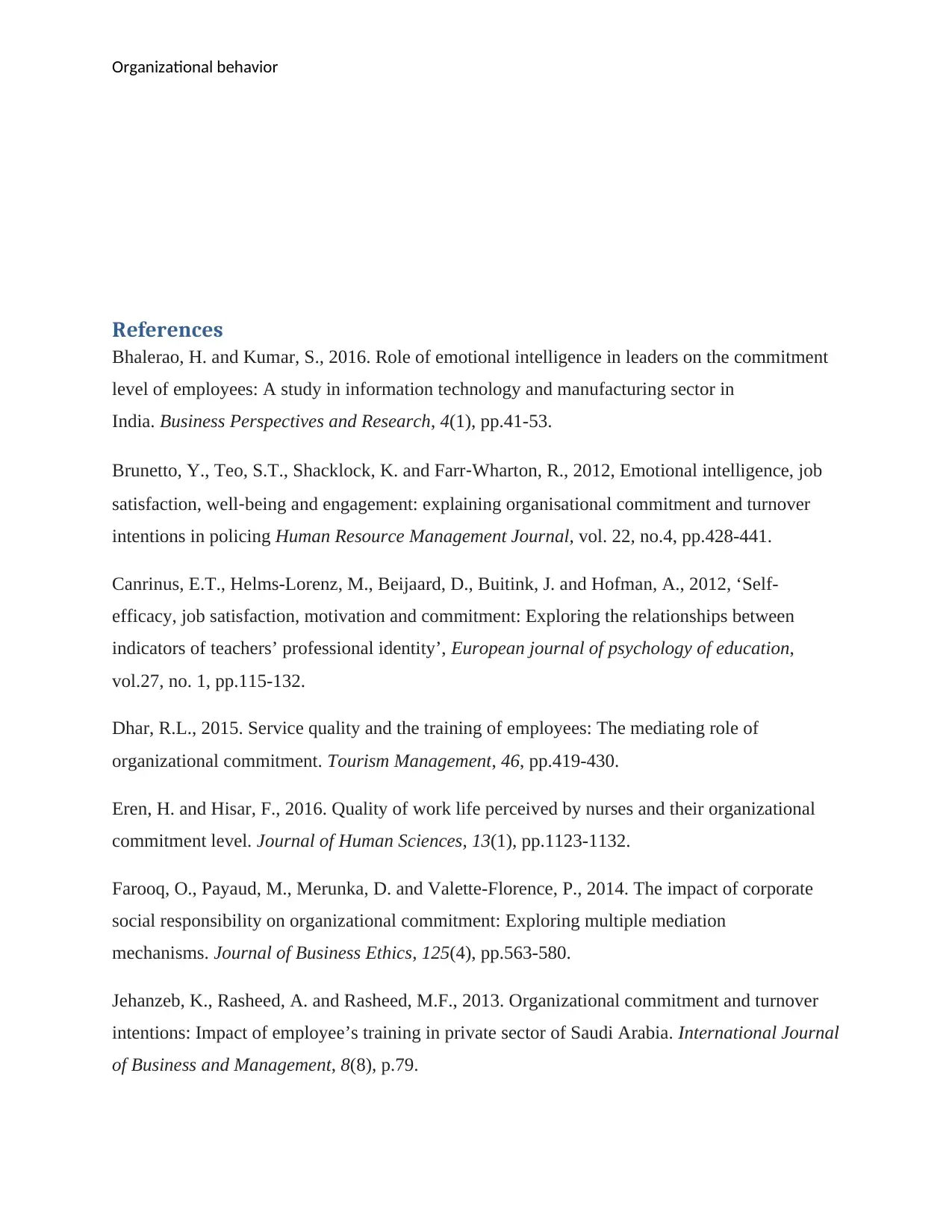
Organizational behavior
References
Bhalerao, H. and Kumar, S., 2016. Role of emotional intelligence in leaders on the commitment
level of employees: A study in information technology and manufacturing sector in
India. Business Perspectives and Research, 4(1), pp.41-53.
Brunetto, Y., Teo, S.T., Shacklock, K. and Farr‐Wharton, R., 2012, Emotional intelligence, job
satisfaction, well‐being and engagement: explaining organisational commitment and turnover
intentions in policing Human Resource Management Journal, vol. 22, no.4, pp.428-441.
Canrinus, E.T., Helms-Lorenz, M., Beijaard, D., Buitink, J. and Hofman, A., 2012, ‘Self-
efficacy, job satisfaction, motivation and commitment: Exploring the relationships between
indicators of teachers’ professional identity’, European journal of psychology of education,
vol.27, no. 1, pp.115-132.
Dhar, R.L., 2015. Service quality and the training of employees: The mediating role of
organizational commitment. Tourism Management, 46, pp.419-430.
Eren, H. and Hisar, F., 2016. Quality of work life perceived by nurses and their organizational
commitment level. Journal of Human Sciences, 13(1), pp.1123-1132.
Farooq, O., Payaud, M., Merunka, D. and Valette-Florence, P., 2014. The impact of corporate
social responsibility on organizational commitment: Exploring multiple mediation
mechanisms. Journal of Business Ethics, 125(4), pp.563-580.
Jehanzeb, K., Rasheed, A. and Rasheed, M.F., 2013. Organizational commitment and turnover
intentions: Impact of employee’s training in private sector of Saudi Arabia. International Journal
of Business and Management, 8(8), p.79.
References
Bhalerao, H. and Kumar, S., 2016. Role of emotional intelligence in leaders on the commitment
level of employees: A study in information technology and manufacturing sector in
India. Business Perspectives and Research, 4(1), pp.41-53.
Brunetto, Y., Teo, S.T., Shacklock, K. and Farr‐Wharton, R., 2012, Emotional intelligence, job
satisfaction, well‐being and engagement: explaining organisational commitment and turnover
intentions in policing Human Resource Management Journal, vol. 22, no.4, pp.428-441.
Canrinus, E.T., Helms-Lorenz, M., Beijaard, D., Buitink, J. and Hofman, A., 2012, ‘Self-
efficacy, job satisfaction, motivation and commitment: Exploring the relationships between
indicators of teachers’ professional identity’, European journal of psychology of education,
vol.27, no. 1, pp.115-132.
Dhar, R.L., 2015. Service quality and the training of employees: The mediating role of
organizational commitment. Tourism Management, 46, pp.419-430.
Eren, H. and Hisar, F., 2016. Quality of work life perceived by nurses and their organizational
commitment level. Journal of Human Sciences, 13(1), pp.1123-1132.
Farooq, O., Payaud, M., Merunka, D. and Valette-Florence, P., 2014. The impact of corporate
social responsibility on organizational commitment: Exploring multiple mediation
mechanisms. Journal of Business Ethics, 125(4), pp.563-580.
Jehanzeb, K., Rasheed, A. and Rasheed, M.F., 2013. Organizational commitment and turnover
intentions: Impact of employee’s training in private sector of Saudi Arabia. International Journal
of Business and Management, 8(8), p.79.
⊘ This is a preview!⊘
Do you want full access?
Subscribe today to unlock all pages.

Trusted by 1+ million students worldwide
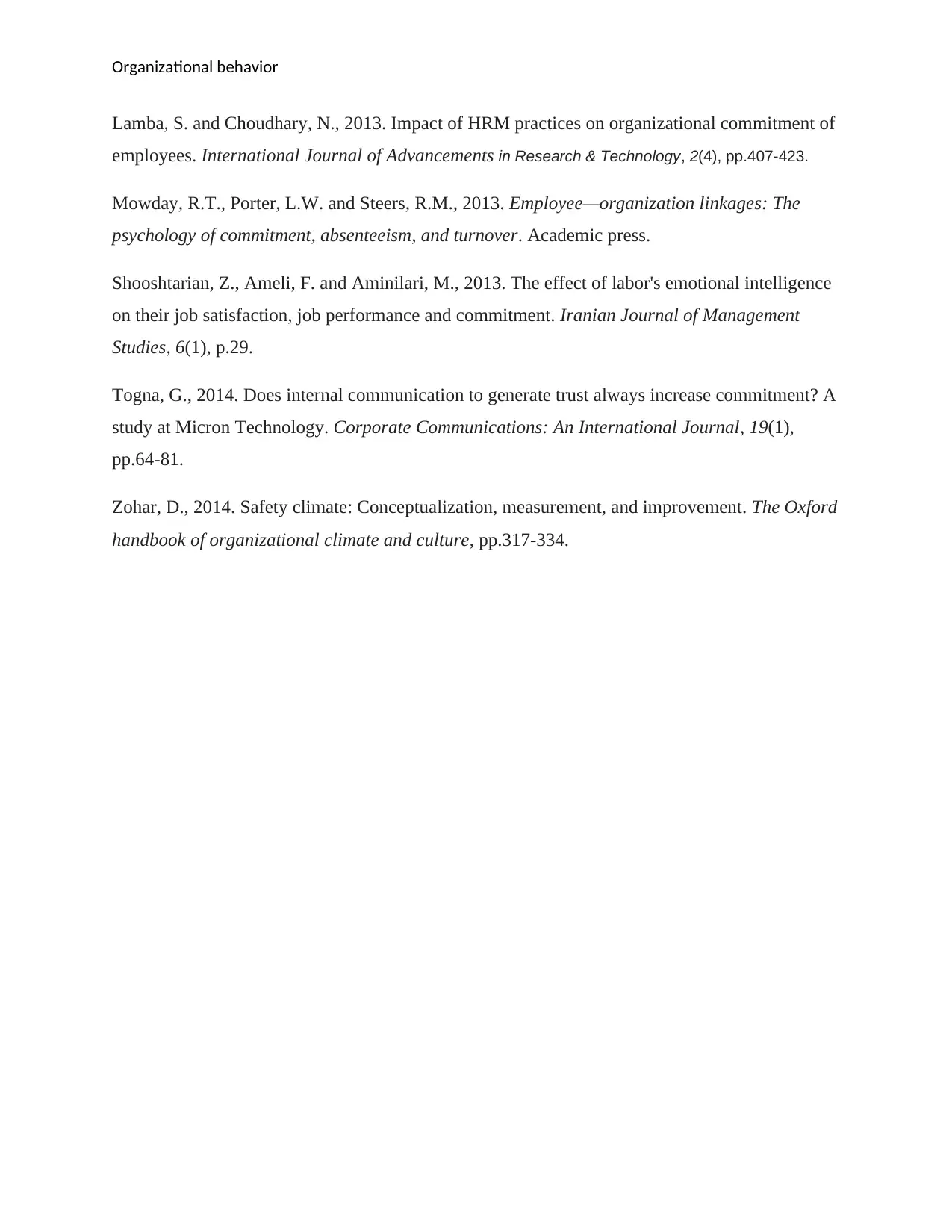
Organizational behavior
Lamba, S. and Choudhary, N., 2013. Impact of HRM practices on organizational commitment of
employees. International Journal of Advancements in Research & Technology, 2(4), pp.407-423.
Mowday, R.T., Porter, L.W. and Steers, R.M., 2013. Employee—organization linkages: The
psychology of commitment, absenteeism, and turnover. Academic press.
Shooshtarian, Z., Ameli, F. and Aminilari, M., 2013. The effect of labor's emotional intelligence
on their job satisfaction, job performance and commitment. Iranian Journal of Management
Studies, 6(1), p.29.
Togna, G., 2014. Does internal communication to generate trust always increase commitment? A
study at Micron Technology. Corporate Communications: An International Journal, 19(1),
pp.64-81.
Zohar, D., 2014. Safety climate: Conceptualization, measurement, and improvement. The Oxford
handbook of organizational climate and culture, pp.317-334.
Lamba, S. and Choudhary, N., 2013. Impact of HRM practices on organizational commitment of
employees. International Journal of Advancements in Research & Technology, 2(4), pp.407-423.
Mowday, R.T., Porter, L.W. and Steers, R.M., 2013. Employee—organization linkages: The
psychology of commitment, absenteeism, and turnover. Academic press.
Shooshtarian, Z., Ameli, F. and Aminilari, M., 2013. The effect of labor's emotional intelligence
on their job satisfaction, job performance and commitment. Iranian Journal of Management
Studies, 6(1), p.29.
Togna, G., 2014. Does internal communication to generate trust always increase commitment? A
study at Micron Technology. Corporate Communications: An International Journal, 19(1),
pp.64-81.
Zohar, D., 2014. Safety climate: Conceptualization, measurement, and improvement. The Oxford
handbook of organizational climate and culture, pp.317-334.
1 out of 7
Related Documents
Your All-in-One AI-Powered Toolkit for Academic Success.
+13062052269
info@desklib.com
Available 24*7 on WhatsApp / Email
![[object Object]](/_next/static/media/star-bottom.7253800d.svg)
Unlock your academic potential
Copyright © 2020–2026 A2Z Services. All Rights Reserved. Developed and managed by ZUCOL.





